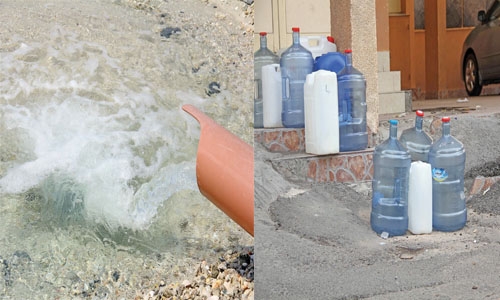Water conservation gets renewed focus
While removal of subsidies gives the public a financial reason to save water, environmentalists say that water conservation should be done for ecological reasons as much as economical.
The fact that in Bahrain water consumption per person is double that of international standards is a shame, said environmentalists, who urged the public to adopt measures to conserve water. Although Bahrain needs to use expensive water desalination methods to produce purified water for the masses, the water continues to be misused by the public. Bahrain residents need to take conscious efforts to reduce water consumption for the benefit of the environment, they urged.
Conservation of water is expected to become a topic of interest as subsidies for water are set to be removed.
Currently, the average water bill of a two room flat is BD5 (@80 fils /unit) with the average consumption of 62.5 units. From March this year, it will be increased to BD12.5 (200 fils/unit).
In 2017, it will be increased to BD18.8 (300fils/unit) and in 2018 it will be BD31.3 (@500 fils/unit) while in 2019 it will be BD46.9 (@750 fils/unit). It means that the present water bill of a flat will be increased from BD5 to BD46.9 – almost 10 times higher than today. In other words there will be an increase of BD41.9 in the water bill for 2-room flat.
Supreme Council for Environment Head of Waste Disposal Unit Rehan Ahmed told DT News that currently the water consumption in Bahrain is over 500 litres per person per day, which is almost double the international standard.
“We need to understand that the main source of water supply in the country is through expensive sea water desalination plants. Water is a basic commodity and is heavily subsidised in the country, due to which its use and misuse is increasing. We are not conserving water mainly due to lack of awareness. We need to do it now as the more we use, the more we have to pay,” he said.
“The main areas where we can conserve water is in the bathroom and kitchen. We need to install water-efficient low flow shower-head and take shorter showers avoiding use of bathtubs. This will lower not only the hot water use but also heating costs. Water can be conserved in laundry by using washing machine only when the load is full and utilising only normal water as most detergents available are efficient and do not require hot water. Water use in kitchen can be reduced by washing utensils not in running water but by filling the sink with water and doing cleaning or using energy efficient dish washers at shorter cycles with full capacity,” he added.
Activist Ali Rajab said public awareness is crucial in tackling the issue of wastage of water.
“It is important in many respects, and everyone knows that water is one of the precious resources of all nature as it is the source of nature. Conserving water will provide more energy and lower potential economic costs. Unfortunately, all of that is well known to everyone yet very few will take an action or make a genuine commitment to conserve it. It’s strange just by looking after the government announcement to stop the financial support to water and electricity, everyone started realising the importance of putting plans to conserve water and electricity. Families started educating their children seriously not to waste water in taking long showers or leaving the tap running for unnecessary use. They also educate their children not to keep the lights open when it’s unnecessary. The feeling that the resource is limited and costly gave us sense of its real value.”
He said that the government could also do more “The government is a regulatory institution; they need to start placing strict guidelines to guide and support the various societies and initiatives out there. There must be a panel or a line of communication between the government and those societies. We need a clear path for recruitment. We have many skills and capabilities in this country especially within the youth population; we are only missing communication and support. Once this is established, the momentum of awareness and development will increase magnificently,” he said.
Related Posts

